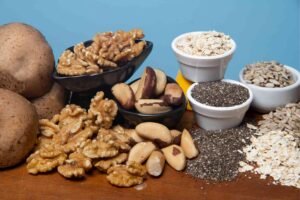The Role of Nutrition In Boosting Fertility
Fertility is a journey that many couples embark on with hope, excitement, and sometimes a bit of uncertainty. While there are various factors that influence conception, one of the most crucial yet often overlooked aspects is nutrition in boosting fertility. What you eat can play a direct role in your reproductive health, affecting both egg and sperm quality, hormonal balance, and overall chances of conceiving.
If you’ve been trying to conceive or planning to start your journey soon, let’s talk about how food can be your ally in this process. This blog will explore the role of nutrition in boosting fertility, the best foods to include in your diet, and those you might want to avoid.
How Does Nutrition Impact Fertility?
The food we eat acts as fuel for every process in our body, including reproduction. Poor nutrition can lead to hormonal imbalances, inflammation, and nutrient deficiencies—all of which can negatively impact fertility in both men and women. Nutrition in boosting fertility is about more than just eating healthy; it’s about consuming the right nutrients that support reproductive health.
Key areas where nutrition influences fertility:
- Hormonal Balance: Certain nutrients help regulate estrogen, progesterone, and testosterone levels.
- Egg and Sperm Quality: Antioxidants protect reproductive cells from oxidative stress.
- Ovulation and Menstrual Health: A nutrient-rich diet can support regular ovulation.
- Sperm Count and Motility: Nutritional choices can directly impact sperm production and movement.
- Reducing Inflammation: Chronic inflammation can lead to conditions like PCOS and endometriosis, both of which can make conception difficult.
Now that we understand why nutrition matters, let’s dive into the best fertility-friendly foods!
Best Foods for Boosting Fertility
1. Leafy Greens: Nature’s Multivitamin
Spinach, kale, and Swiss chard are loaded with folate, which plays a significant role in reproductive health. Folate helps with DNA synthesis and is crucial for healthy egg development.
2. Fatty Fish: Omega-3 Powerhouse
Salmon, mackerel, and sardines provide essential omega-3 fatty acids, which support hormone production and improve blood flow to reproductive organs. Omega-3s are also linked to improved embryo implantation.
3. Nuts and Seeds: Nutrient-Dense Snacks
Walnuts, flaxseeds, and chia seeds contain healthy fats and antioxidants that support sperm and egg health. Brazil nuts are an excellent source of selenium, which is vital for sperm motility.

4. Whole Grains: Complex Carbs for Hormonal Balance
Brown rice, quinoa, and oats provide complex carbohydrates that help regulate blood sugar levels. This is particularly beneficial for women with PCOS, as insulin resistance can disrupt ovulation.
5. Eggs: A Protein and Choline Source
Eggs are rich in protein, vitamin D, and choline, which are essential for fetal brain development. Choline also helps with cell membrane formation, benefiting egg health.
6. Dairy (or Alternatives): Calcium and Vitamin D Boost
Full-fat dairy has been linked to better fertility outcomes compared to low-fat options. Greek yogurt, cheese, and plant-based dairy alternatives fortified with calcium and vitamin D can be great additions.
7. Berries: Antioxidant-Rich Superfoods
Strawberries, blueberries, and raspberries are packed with antioxidants that protect eggs and sperm from oxidative damage, increasing the chances of a healthy pregnancy.
8. Lean Proteins: Essential Building Blocks
Chicken, turkey, and lean cuts of beef provide amino acids that are essential for reproductive hormone production. For vegetarians, lentils and chickpeas are excellent plant-based alternatives.
9. Avocados: The Fertility Fruit
Rich in monounsaturated fats, avocados help reduce inflammation and support hormone production. They also contain folate, potassium, and vitamin E—all beneficial for reproductive health.
10. Dark Chocolate: A Sweet Fertility Booster
Dark chocolate in moderation contains flavonoids that enhance blood circulation to reproductive organs and support sperm quality.

Foods to Avoid for Optimal Fertility
While some foods boost fertility, others can hinder it. Here are some to limit or avoid:
- Processed Foods: High in unhealthy fats and additives that can disrupt hormonal balance.
- Trans Fats: Found in fried foods and baked goods, trans fats can reduce insulin sensitivity, affecting ovulation.
- Excess Sugar: Spikes in blood sugar levels can lead to hormonal imbalances.
- Alcohol: Heavy alcohol consumption can lower sperm count and interfere with ovulation.
- Caffeine: While moderate caffeine is okay, excessive intake has been linked to a higher risk of miscarriage.

Lifestyle Factors That Complement Good Nutrition
Besides following a fertility-friendly diet, making other lifestyle adjustments can further enhance your chances of conceiving. Here are a few tips:
- Maintain a Healthy Weight: Being underweight or overweight can disrupt hormonal balance and ovulation.
- Stay Hydrated: Water supports cervical mucus production, making it easier for sperm to travel to the egg.
- Exercise in Moderation: Too much intense exercise can negatively impact ovulation, while moderate activity supports fertility.
- Manage Stress: Chronic stress can elevate cortisol levels, which may interfere with reproductive hormones.
- Get Enough Sleep: Proper rest is essential for hormonal regulation and overall well-being.
Supplements That Support Fertility
While a balanced diet should be the priority, certain supplements can further support nutrition in boosting fertility:
- Prenatal Vitamins: Ensure adequate intake of folic acid, iron, and vitamin D.
- Coenzyme Q10 (CoQ10): Supports egg and sperm quality.
- Myo-Inositol: Beneficial for women with PCOS to improve insulin sensitivity and ovulation.
- Vitamin B6 and B12: Help with hormonal balance and overall reproductive health.
- Zinc and Selenium: Important for sperm production and motility.

Final Thoughts
When it comes to nutrition in boosting fertility, small changes can make a big difference. A diet rich in whole, nutrient-dense foods can significantly improve your chances of conception by supporting hormonal balance, egg and sperm quality, and overall reproductive health. Combine these dietary choices with a healthy lifestyle, and you’ll be giving yourself the best possible chance to welcome a new life into the world.
If you’re struggling with fertility, consider consulting a nutritionist or a fertility specialist to create a personalized plan tailored to your needs. Remember, every small step towards better health is a step towards a successful pregnancy!


